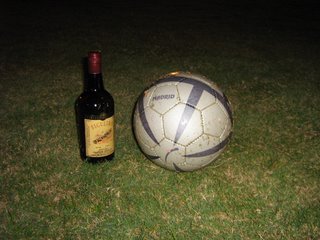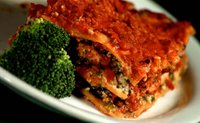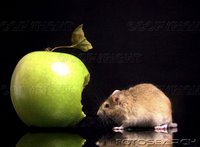It became clear when the Buddha laughed on the green grass with a bottle of port wine that the battle was won, convincingly, leaving the opponents search for excuses and ice to numb their pain. Sprays and creams didn’t work, because the pain was somewhere deeper. This battle had gone awfully wrong for a group with vociferous supporters, for the other this was the end of a roller coaster ride, a ride that took them to the depths of despair, kicks on the shins inflicted by their own boots, and ultimately the sweet and poetic victory of the underdogs, the written-offs over the over-confident and the under-smarts (is that a fucking word, but that’s how I can describe my team in mild terms).
So it all started in a rather dull mood before the ball was kicked, with murmurs that the weekend break cooled down the insanity of football supporters. It was like having foreplay and taking the weekend off to have sex. But people who know what I am talking about will know that this break can make one mad and change the normal course that was indicated before the break. OK I will leave the sex analogy alone. I don’t want people to falsely accuse me of talking about sex all the time.
But when the ball was moved from the central spot, there was something different in the way the game was defining itself. The Molbios were lacking in something, passes were awry, strikers came to the spot seconds after the ball passed by, defenders gave away passes. Everyone seemed like they had just woken up after partying with the Rolling stones the previous night.
Whatever the Molbios were lacking, the computationals excelled, their trio of Buddha, Jyoti and Vishnu make great short passes, held the ball and passed it around and found the net they did, not once but five fucking times. There was nothing but silence and awe, apart from the munching of chips and samosas in the audience who came to see another routing of the computational dudes by the Molbios, like the opening 3-0 drubbing.
It was raining goals, everyone made merry, Buddha, Jyoti, Vishnu and Venkat on the once infallible opponents. When the first goal was scored by computational, the molbios conceded that they were in trouble, shoulders were drooping, basic trapping went wrong and passes missed by miles. By half time there was no cohesion in their game, just anger and disbelief. It was then easy for the computationals with experienced and intelligent players to capitalize on this lack of confidence to dominate the game completely. Only a late resurgence saw some kind of fight back, which resulted in a late Sandy goal. Just once did Sanjay let the ball go past him and especially on wet grass, this was a tough job.
All is well that ends in a flurry of goals, so the first tournament in the Manesar Premier League was a roaring success. Until the next one comes along to whip some enthusiasm in the rural hinterlands of Haryana, this 5-1 unlikely victory by the Computational Biologists will be talked and deconstructed many many times.
So long…until November.




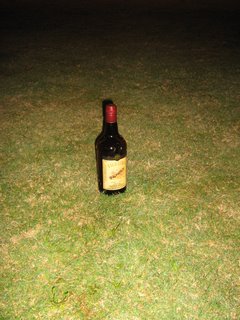
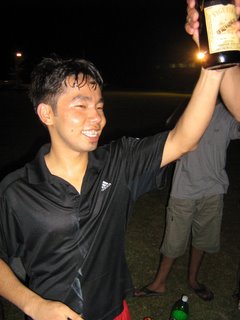
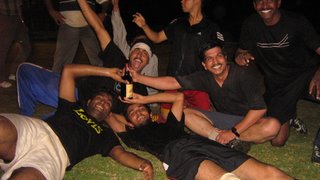 The winning team. The Theoretical Thunders. OK. I admit its a lame name. But they didn't look very lame when they pumped in 5 goals on the favourites.
The winning team. The Theoretical Thunders. OK. I admit its a lame name. But they didn't look very lame when they pumped in 5 goals on the favourites.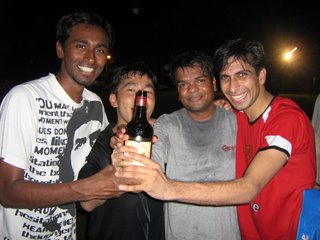 The three captains Leslee (systems ,white), Buddha (theoretical, black) and Sandy (Molbio, Red) with the referee, Manoj Uncle of stem cells fame(Grey T). Without his no-nonsense and professional approach this tournament would have lost all decency and would have become a kickboxing convention.
The three captains Leslee (systems ,white), Buddha (theoretical, black) and Sandy (Molbio, Red) with the referee, Manoj Uncle of stem cells fame(Grey T). Without his no-nonsense and professional approach this tournament would have lost all decency and would have become a kickboxing convention.